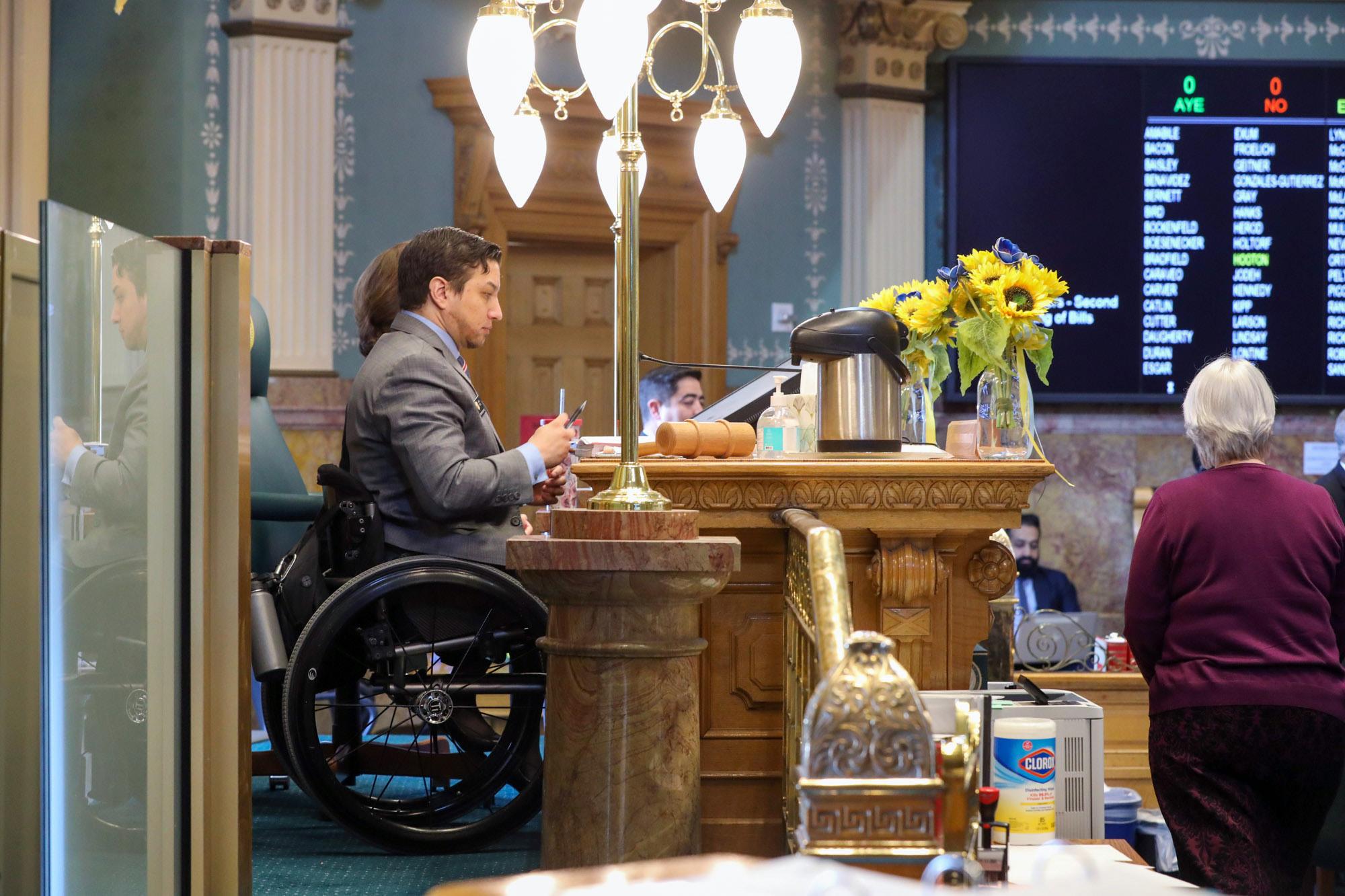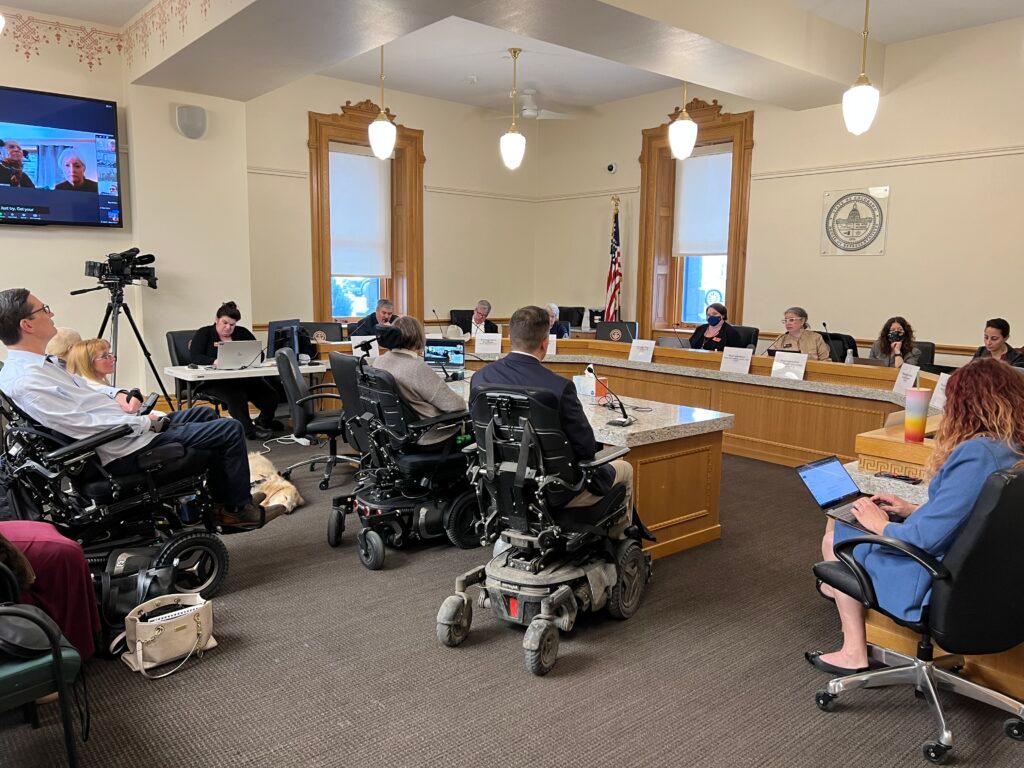
Updated April 29, 2022 at 2 p.m.
The Colorado General Assembly has passed the "Right to Repair" bill — a historic measure that guarantees wheelchair users the right to repair their wheelchairs themselves or at independent repair shops. The bill also requires power wheelchair manufacturers to provide parts, software, firmware, tools and documentation at a reasonable price.
"People should have the right to fix their own stuff. They shouldn't be blocked and hamstrung with obstacles that create a lifecycle monopoly on any product," Rep. Brianna Titone, a lead sponsor, said in a statement. "We're giving Coloradans with wheelchairs the option to get the parts, tools and program access necessary to fix it themselves. Nobody should have to be stuck in a broken wheelchair because they can't fix it."
The bill now awaits Polis' signature.
A separate wheelchair-related bill that would speed up repairs by changing Medicaid reimbursement rules and allow higher reimbursement rates for repairs made in rural areas is pending in the state Senate.
Our original story follows below.
Even the simplest problems with Oliver Giminaro’s powered wheelchair can leave him waiting weeks or longer for a repair.
“You know, it's been a good chair for me — but all machines break down, even the best machines,” the 45-year-old Denverite said in an interview.
Giminaro relies on authorized vendors to replace the chair’s tires, batteries and axles. It can take two months or more to get parts and service from the handful of shops in the area, he said, on top of weeks of delays from Medicaid to approve the repairs.
The wheelchair’s manufacturer, Permobil, says that it only provides parts to authorized vendors because the wheelchairs are medical devices and “most repairs require technical knowledge of the product.”
While he waits, Giminaro, who is quadriplegic, is forced to spend days in bed or using an ill-fitting rental chair.
“It can be really devastating,” he said. “And a lot of it is knowing that there's bureaucracy behind it.”
A pair of bills at the state legislature is meant to reduce that bureaucracy and get people moving again more quickly. One of the bills, HB22-1031, aims to give wheelchair users the “right to repair” the devices themselves or through independent repair shops.

The proposal would require power wheelchair manufacturers to provide parts, software, firmware, tools and documentation, all of which are important for repairs, to owners and independent repair shops. Giminaro hopes that would make it easier for other shops — or even mechanics who don’t specialize in wheelchairs — to perform simple repairs.
Opponents in the industry say that users are already allowed to undertake basic work themselves, but providing software and hardware for more complex repairs could lead to damaged equipment or even endanger users.
“If someone’s repairing that equipment, they’ve been trained, they know what to do, they have the right insurance in place,” said Don Clayback, executive director for the National Coalition For Assistive & Rehab Technology, which represents manufacturers.
“This would really open up the marketplace to people who, in our mind, are unqualified,” he added in committee testimony.
Advocates point out that long waits for repairs are just as disruptive. Giminaro said that the few authorized repair shops have grown “complacent.”
“It's nuts and bolts, and it's little black boxes that are plug and play,” he said. “The thought that it takes somebody who's trained for a decade, that's not realistic.”
The bill would not address one concern: the warranty. Giminaro and others said they’ve been warned by vendors that pursuing repairs themselves could void their wheelchairs’ warranty.
The state proposal doesn’t address that question — but federal regulators already say that warranties can’t be canceled just for getting a repair at a non-authorized dealers, according to Prof. Blake Reid of Colorado Law. (However, a botched repair can still void a warranty.)
The bill is sponsored by Reps. Brianna Titone and David Ortiz and Sen. Rachel Zenzinger, all Democrats. Ortiz is the only state lawmaker who uses a wheelchair. They also have a complementary bill, HB22-1290, which aims to speed up repairs by changing Medicaid reimbursement rules and allowing higher reimbursement rates for repairs made in rural areas.
Last year, lawmakers rejected a “right to repair” bill from Titone that applied to a much broader set of devices, from tractors to phones and computers.
“If I purchase it, I should have the right to take my personal freedom and responsibility to work on my own property,” said Chris Hinds, a Denver city councilman who uses a wheelchair.
The wheelchair right-to-repair bill is set for a House vote on Friday and may head next to the Senate.
More coverage of the 2022 Colorado legislative session:
- Landmark bill protecting the right to an abortion in Colorado law is heading to the governor
- As fentanyl deaths climb in Colorado, policymakers unveil bill to fight back
- Bill to protect sex workers reporting crimes passes the Colorado House unanimously
- Congress could ban stock trading by its members. Do Colorado’s lawmakers support that idea?








